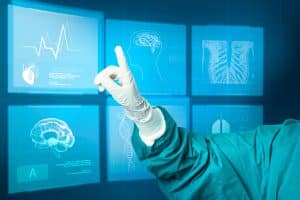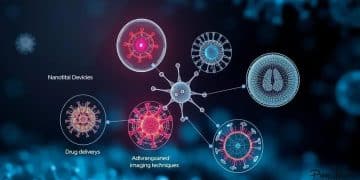AI in healthcare diagnostics: Trends and challenges

AI in healthcare diagnostics enhances accuracy and efficiency by utilizing advanced algorithms to analyze data, streamline patient management, and improve outcomes while addressing challenges like data quality and regulatory compliance.
AI in healthcare diagnostics is reshaping how we approach medical evaluations. Imagine if machines could assist doctors in identifying diseases earlier than ever. Exciting, right? Let’s dive into this transformative topic.
The role of AI in enhancing diagnostic accuracy
The role of AI in enhancing diagnostic accuracy is becoming increasingly vital in the medical field. With advanced technology, healthcare providers can now analyze data quickly and more accurately than ever before.
How AI Improvements Work
Many tools use algorithms to evaluate patient information. This process helps doctors make better, data-driven decisions. Algorithms learn from vast amounts of data, continuously improving their predictions.
Impact on Diagnostic Processes
When AI systems are integrated into diagnostic processes, they bring several benefits:
- Increased speed of analysis
- Reduction in human error
- More comprehensive data assessments
- Support in identifying rare conditions
As these systems evolve, they provide insights that were previously impossible. For example, AI can now assist in interpreting medical imaging, such as X-rays and MRIs.
This capability allows for earlier detection of diseases. Imagine being able to spot cancerous cells before they spread. Such advancements are transforming patient outcomes and treatment effectiveness.
Case Studies of AI Success
Numerous case studies demonstrate the power of AI in diagnostics:
- A radiology department that reduced diagnosis times by 30%
- A pathology lab that improved cancer detection rates
- AI tools that help detect diabetic retinopathy in clinics
These examples illustrate just how significant the role of AI has become in improving diagnostic processes. As technology continues to advance, we can expect even more enhancements in the accuracy and effectiveness of healthcare diagnostics.
Current trends in AI-driven diagnostic tools

Current trends in AI-driven diagnostic tools showcase how technology is revolutionizing the healthcare landscape. With innovative approaches, these tools enhance efficiency and accuracy in medical diagnoses.
Emerging Technologies
One major trend is the rise of predictive analytics. This technology helps anticipate health risks by analyzing patient data and identifying patterns. These insights support doctors in making informed decisions regarding patient care.
- Machine learning algorithms are increasingly used for data analysis.
- Natural language processing assists in understanding clinical notes.
- Image recognition technology improves interpretation of medical images.
Another trend gaining momentum is the integration of AI with wearable devices. Patients can monitor their health continuously, and AI analyzes this data in real time. This proactive approach allows for early detection of potential health issues.
Telemedicine and AI Collaboration
Telemedicine is another area where AI is making significant inroads. By combining artificial intelligence with telehealth platforms, practitioners can analyze symptoms more accurately. This combination enhances patient interactions and offers personalized care.
AI-driven diagnostic tools are also being developed for specific conditions. For example, tools that focus on dermatology can analyze skin lesions and provide instant feedback. These advancements are improving patient outcomes and reducing the burden on healthcare professionals.
As we look toward the future, the enhancement of telemedicine and home diagnostic tools will make healthcare more accessible. Harnessing the power of AI enables healthcare providers to deliver tailored treatments effectively.
Challenges faced in AI implementation
There are several challenges faced in AI implementation within healthcare systems. These obstacles can hinder the full potential of artificial intelligence in diagnostics and treatment.
Data Quality and Accessibility
One significant challenge is ensuring high-quality data is available. AI systems rely on data to learn and improve. If the data is incomplete or inaccurate, it can lead to poor outcomes. Additionally, gaining access to diverse datasets can be difficult due to privacy concerns.
- Health records may vary in format.
- Lack of standardized data across platforms.
- Patient confidentiality must be maintained.
Moreover, integrating AI tools with existing systems poses another hurdle. Healthcare providers must balance new technologies with their current practices to ensure smooth transitions.
Regulatory and Compliance Issues
Navigating regulatory requirements can also be complex. Different regions have specific laws governing data usage and AI applications. This inconsistency can slow the adoption of AI solutions in healthcare settings.
Beyond regulations, many healthcare professionals may lack the necessary training to utilize AI tools effectively. Educating staff about these technologies is crucial for successful implementation. Without proper knowledge, the benefits of AI could go unrealized.
Additionally, there might be resistance to change from both patients and medical staff. People often feel more comfortable with traditional methods. Overcoming this reluctance requires communication that highlights the advantages of AI, such as improved accuracy and efficiency.
Case studies of AI success in healthcare
Case studies of AI success in healthcare highlight how artificial intelligence is reshaping the medical field. These real-life examples showcase effective applications that improve patient care and diagnostic processes.
Improving Diagnostics with AI
One notable case study involves a hospital using AI algorithms to analyze medical images. By implementing deep learning technology, radiologists were able to detect conditions like pneumonia and tumors more accurately. This resulted in a significant reduction of misdiagnoses and improved patient outcomes.
- AI systems reduced diagnostic time by 25%.
- They increased detection rates for early-stage cancers.
- Patient trust in diagnoses improved drastically.
Another success story comes from an AI platform that assists in identifying rare genetic disorders. By analyzing genetic data at remarkable speeds, this platform helps specialists make informed decisions, leading to timely treatments and improved patient health.
Enhancing Patient Management
AI has also shown significant promise in patient management. In one healthcare system, an AI-powered chatbot was introduced to handle patient inquiries. This system efficiently answered questions about medications, appointment scheduling, and general health advice.
As a result, patient satisfaction scores increased, and staff had more time to focus on complex cases. This AI tool proved effective in managing routine queries, allowing healthcare providers to enhance care quality for patients needing more attention.
Moreover, an integrated AI system in emergency departments has streamlined workflow. By analyzing patient data upon arrival, AI helps prioritize treatment for the most critical cases. These implementations not only save time but can also save lives in emergency situations.
Future outlook for AI in healthcare diagnostics
The future outlook for AI in healthcare diagnostics is promising and full of potential. As technology advances, we can expect groundbreaking improvements in how diseases are detected and managed.
Advancements in Machine Learning
Machine learning algorithms are becoming increasingly sophisticated. In the coming years, these systems will analyze even larger datasets, leading to more accurate predictions about patient conditions. This will enhance diagnostic capabilities, allowing for early interventions.
- Better accuracy in identifying diseases.
- Reduction in false positives and negatives.
- Personalized treatment plans based on patient data.
AI will also integrate more seamlessly into everyday healthcare practices. From routine check-ups to emergency responses, AI tools will assist healthcare professionals in making informed decisions quickly.
Telehealth and Remote Diagnostics
The rise of telehealth services will significantly boost AI’s role in diagnostics. Patients can receive accurate diagnoses from the comfort of their homes. AI technologies will analyze health data collected through wearable devices, alerting healthcare providers to potential issues.
As a result, patients will experience timely access to medical expertise without the limitations of geographical barriers. This trend promotes a proactive approach to health management, enabling earlier detection and treatment of conditions.
Moreover, the emphasis on data security and patient privacy will drive innovations in secure AI systems. Advanced encryption methods will protect sensitive information while still allowing for the effective use of AI in diagnostics.
FAQ – Frequently Asked Questions about AI in Healthcare Diagnostics
How does AI improve diagnostic accuracy?
AI enhances diagnostic accuracy by analyzing vast amounts of data quickly, helping healthcare providers make more informed decisions.
What are the main challenges in AI implementation?
Key challenges include data quality, regulatory compliance, and the need for specialized training among healthcare professionals.
How does AI impact patient care?
AI streamlines workflows and provides timely data analysis, leading to better patient management and overall health outcomes.
What future trends can we expect in AI for healthcare?
Future trends include advancements in machine learning, wider telehealth services, and enhanced security protocols for patient data.





